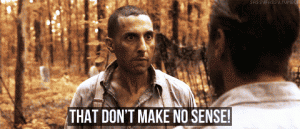I’ve said before and I’ll say again that I will not critique somebody for their reading format choices. Print has its advantages. Digital has its advantages. And if you happen to be someone who embraces one over the other, more power to you! As long as it brings you joy in whatever you’re reading, I do not care what format you’re reading it in.
That said, I gotta raise an eyebrow at this post on The Digital Reader, which is in turn pointing off to this post on the Powell’s Books blog, in which the author of the essay describes how he tried to solve the problem of what to read while hiking the Appalachian Trail.
His solution was to buy tattered copies of several books he was interested in, chop them up into shorter pieces, mail them to himself at various points along his route, and slowly burn them as campfire fuel to get rid of the weight.
And my answer to this is “wut?”
Because seriously, this scenario strikes me as exactly when I’d want to be carrying a small ereader. There are very tiny ones, like the Kobo Mini. And hell, if you have a smartphone, you’ve got a reading-capable device right there, and most smartphones are going to be lighter than the various ereaders I’ve encountered anyway. For me, the issue here would be whether I could deal with reading on a smartphone for the duration of a hike, vs. reading on e-ink. But if I were in this guy’s shoes and wanting to minimize my carried weight, I’d be seriously considering just reading on my phone. Because I’d have the phone anyway, in case of emergencies. So why not read books on it?
To solve the power problem, you could carry a small battery like the one I’ve always got in my backpack, a Jackery. And to keep that charged, solar-powered hand-cranks are things that exist. (Why do I know this? Because you find out about these things when you live in an area prone to power outages!) Macworld describes several portable battery chargers in this post, including at least one described as specifically useful for camping.
And when you’ve got light, easily portable tech that can solve a problem for you, I can’t see why buying old paperbacks, cutting them up into pieces JUST so you can tape them back together, mailing the resulting hacked books to yourself, and then burning the results as campfire fuel is a superior option. Particularly when it involves destroying books. The essay writer even admits that that gave him some qualms, which he overcame in the interests of cutting down the weight in his backpack. And he handwaved off his qualms as well by pointing out that millions of books get thrown away or destroyed every year.
Which, to me, seems like a really odd justification for someone who prefers reading print over digital. I mean, if you prefer reading print, awesome!
But to deliberately put yourself into a position where, in order to read in your preferred format, you are destroying books in that format, on purpose?
All I can say is, again, “wut?”

